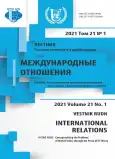Postcoloniality in Global and Regional Dimensions
- Authors: Neklessa A.I.1
-
Affiliations:
- Institute for African Studies, Russian Academy of Sciences
- Issue: Vol 21, No 1 (2021): Conceptualizing the Problems of World Politics through the Prism of IR Theory
- Pages: 9-19
- Section: THEMATIC DOSSIER
- URL: https://journal-vniispk.ru/2313-0660/article/view/320326
- DOI: https://doi.org/10.22363/2313-0660-2021-21-1-9-19
- ID: 320326
Cite item
Full Text
Abstract
The article reflects the results of research in the North-South Group focused on the development of the polycentric, personalized and mobile Universe, while the ensemble of interconnected influential concepts (postmodernity and postcoloniality) had been analyzed. The current view on globalization as a political and economic cohesion of the modern world, contrasts the view on global restructuring as a consequence of the crisis of institutions of world bureaucracy, collectivist ideo-party totality, others unifying administrative and sociocultural mechanics. Attention is drawn to the trends of individuation and privatization, substitution of subordination by subsidiarity, which reflects the crisis of the national statehood format. The complex reality that arises in the bosom of modern culture, implements its own polycentricity, based not on the etatist symphony, but on a distributed set of diasporas, corporate or personal sovereignty. Postmodernity, denying the former world order, reproduces the semblance of a post-colonial situation, which allows us to turn to the experience of countries that have gained political sovereignty and mastered their new status in its various versions. Coloniality is understood as the result of hegemony, which goes beyond the prevailing interpretation of colonialism, but as a repressive emanation of the hegemonic world, offering subaltern other two modus of behavior: submission or subjugation assimilation, denying the legality of alternative self-realization or resistance. Pathos of post-modern, post-imperial and post-colonial positions declares the right of the individual and the communities to realize their original identity, dissimilation of former loyalties and sovereign search for alternatives. The universal quest is for political, sociocultural and semantic counter-hegemony, which also denies the current world to be an instrument of the modal-assimilation complex “knowledge - power”. The urgency of this problem was confirmed by the riots that broke out in the United States and other parts of the world in 2020.
About the authors
Alexander Ivanovich Neklessa
Institute for African Studies, Russian Academy of Sciences
Author for correspondence.
Email: neklessa@intelros.ru
Head, the “North - South” Group, Centre for Civilizational and Regional Studies, Institute for African Studies, Russian Academy of Sciences; Chair, the Commission on Socio-Cultural Issues of Globalization; Member, Bureau of the Academic Council “History of the World Culture”, the Presidium of the Russian Academy of Sciences
Moscow, Russian FederationReferences
- Adorno, T. (2003). Negative Dialectics. Moscow: Nauchnyi mir publ. (In Russian).
- Amin, S. (2007). The Virus of Liberalism. Permanent War and the Americanization of the World. Moscow: Evropa publ. (In Russian).
- Bhabha, H. (1994). The Location of Culture. Routledge.
- Brutents, K.N., Gromyko, A.A., Kiva, A.B. et al. (Eds). (1982). Socialist Orientation of the Liberated Countries: Some Questions of Theory and Practice. Moscow: Mysl’ publ. (In Russian).
- Eisenstadt, S. (1999). Revolution and Transformation of Societies: A Comparative Study of Civilizations. Moscow: Aspekt Press publ. (In Russian).
- Fanon, F. (1963). The Wretched of the Earth. New York: Grove Press.
- Forsdick, C., & Murphy, D. (Eds.). (2009). Postcolonial Thought in the French Speaking World. Liverpool: Liverpool University Press. doi: 10.5949/UPO9781846319808
- Forster, E. (1965). Two Cheers for Democracy. Boston: Mariner Books.
- Fromm, E. (1992). Human soul. Moscow: Respublika publ. (In Russian).
- Gandhi, L. (1998). Postcolonial Theory: A Critical Introduction. New York: Columbia University Press.
- Gramsci, A. (1991). The Prison Notebooks. Moscow: Politizdat publ. (In Russian).
- Humboldt, A. (2014). Views of the Cordilleras and Monuments of the Indigenous Peoples of the Americas: A Critical Edition. Chicago: University of Chicago Press.
- Khalaji, M. (2008). Apocalyptic Politics: On the Rationality of Iranian Policy. Policy Focus Series of the Washington Institute for Near East Policy, 79, 1—39.
- Maldonado-Torres, N., France, M.F.M., We, J.E.A., & Radebe, Z. (2019). Editorial Introduction: Frantz Fanon, Decoloniality, and the Spirit of Bandung. Bandung: Journal of the Global South, 6(2), 153—161. doi: 10.1163/21983534-00602001
- Marcuse, G. (2011). Critical Theory of Society: Selected Works on Philosophy and Social Criticism. Moscow: AST-Astrel publ. (In Russian).
- Merleau-Ponty, М. (1955). Les Aventures de la dialectique. Paris: Gallimard. (In French).
- Mingolo, W., & Walsh, C. (2018). On Decoloniality: Concept, Analytics, Praxis. Durham, NC: Duke University Press.
- Neklessa, A.I. (2020a). The Privatization of Future. New Semantics, Concept & Practice of the Global Society. Polis. Political Studies, (2), 153—166. (In Russian). doi: 10.17976/jpps/2020.02.11
- Neklessa, A.I. (2020b). The Transit of Civilization: Methodological and Prognostic Aspects. Economics of Contemporary Russia, 4(91), 132—146. (In Russian).
- Rizzi, B. (1939). La Bureaucratisation du Monde. Paris: Les Presses Modernes. (In French).
- Said, E. (1978). Orientalism. New York: Pantheon Books.
- Sauvy, A. (1986). Trois Mondes, Une Planète. Vingtième Siècle. Revue d'histoire, (12), 81—83. (In French).
- Spivak, G.C. (1988). Can the Subaltern Speak? In C. Nelson & L. Grossberg. (Eds.). Marxism and the Interpretation of Culture. Basingstoke: Macmillan Education (pp. 271—313).
- St. Justin, Philosopher and Martyr: Apologies. (1995). Foreword by A.I. Sidorov. Moscow: Blagovest publ. (In Russian).
- Tlostanova, M. (2020). The Postcolonial Condition and The Decolonial Option: A Postsocialist Mediation. Novoe Literaturnoe Obozrenie, (161), 66—84. (In Russian).
Supplementary files









